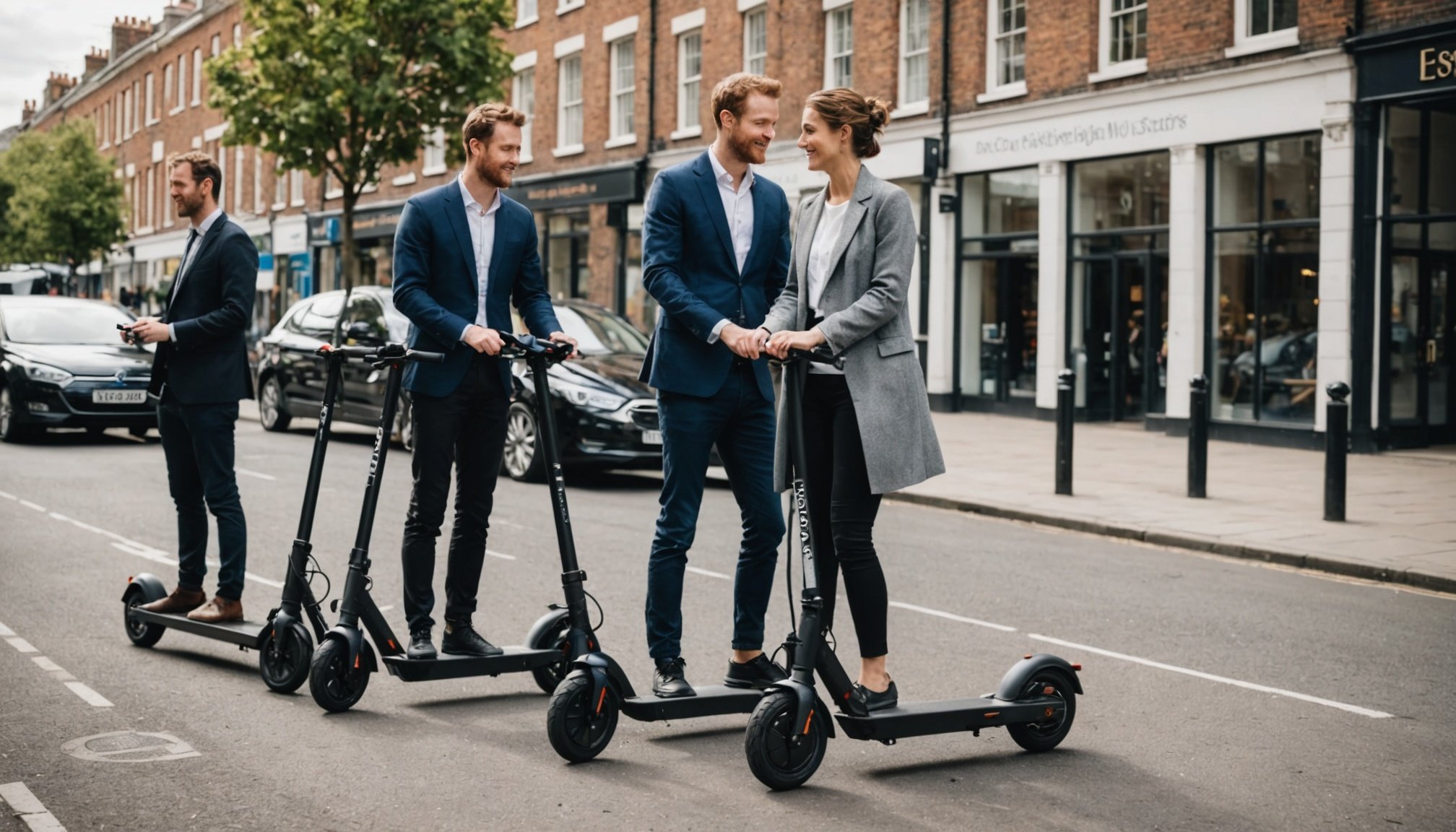Overview of Electric Scooters as a Transportation Solution
Electric scooters are transforming urban mobility by providing a convenient and eco-friendly transport option. These vehicles are powered by electricity, making them a sustainable transport choice that reduces emissions compared to petrol-fueled cars and buses. Designed for short trips, they cater to the growing need for agile and efficient movement in crowded city environments.
In the UK, electric scooters are experiencing a surge in popularity, reflected by significant growth statistics. Recent reports indicate a considerable increase in e-scooter usage in urban areas, as more individuals seek alternatives to traditional forms of transport like cars, bicycles, and public transit. This trend highlights a shift towards more sustainable and accessible transportation methods.
In parallel : Fostering future leaders: an essential blueprint for establishing entrepreneurship incubation programs in uk schools
When compared to traditional options, electric scooters offer unique advantages. They help alleviate traffic congestion, allowing for seamless first-mile and last-mile travel that integrates with larger transit systems. Unlike conventional vehicles, they emit no direct pollutants, contributing to a cleaner environment. Moreover, their compact size makes them ideal for navigating tight urban spaces, offering a level of convenience unmatched by other modes of transport. Overall, electric scooters are not just a passing trend but a long-term solution for enhancing urban mobility.
Policies and Regulations Surrounding Electric Scooters
Electric scooters have rapidly become prominent players in the sphere of urban mobility, prompting the need for an evolving regulatory framework. Understanding the UK legislation governing these devices is imperative for users and stakeholders alike.
In parallel : Fostering a culture of innovation: key strategies for empowering forward-thinking in uk public sector organizations
Current Legal Framework
In the UK, electric scooters are subject to national legislation requiring their use only on private land with the landowner’s consent unless part of an authorised rental scheme. This is largely due to safety policies addressing the potential risks associated with their operation in public spaces, such as roads and pavements.
Local Government Initiatives
Local government initiatives play a crucial role in the integration of electric scooters into urban transport networks. Many cities are piloting e-scooter rental programs, which include dedicated lanes and parking zones to reduce clutter and ensure user compliance with safety regulations.
Safety Guidelines for Users
Safety guidelines are pivotal in safeguarding both users and pedestrians. These include wearing helmets, adhering to speed limits, and understanding the basic operational features of the scooters. These regulations aim to enhance safety while promoting a sustainable transport option that aligns with city-wide goals to reduce emissions and traffic congestion.
Environmental Benefits of Electric Scooters
Electric scooters offer significant environmental benefits that contribute to cleaner urban atmospheres. Primarily, their use leads to marked carbon emissions reductions. While conventional vehicles emit substantial greenhouse gases, scooters, powered by electricity, promise a lower carbon footprint. This shift away from petrol and diesel reduces reliance on fossil fuels and supports sustainable transport initiatives.
In terms of noise pollution, electric scooters also offer notable advantages. Traditional engines contribute significantly to noise in city environments. In contrast, scooters operate quietly, thus decreasing urban noise levels—a subtle yet impactful improvement for city dwellers’ quality of life.
Moreover, the adoption of electric scooters aligns with broader climate goals, emphasising the need for greener transport options. By fostering a shift towards alternatives that emit fewer pollutants, cities can inch closer to climate targets focused on reducing overall emissions.
These vehicles not only act as personal mobility solutions but also support global efforts to mitigate the adverse effects of climate change. Incorporating electric scooters into urban transport strategies is a forward-thinking approach to ensuring sustainable urban mobility that benefits current and future generations alike.
Benefits for Urban Mobility
Electric scooters play a vital role in addressing issues like traffic congestion in bustling city centres. Their compact design allows for efficient navigation through crowded areas, making them a favoured option for reducing vehicular buildup. By easing traffic flow, scooters not only improve overall travel time but also contribute to a more fluid urban transport network.
One of the key advantages of electric scooters is their enhancement of accessibility for first-mile and last-mile connectivity. They serve as an excellent link between larger transport systems, helping commuters complete their journeys seamlessly. This ensures that areas difficult to access by traditional public transport are more reachable, promoting inclusivity in urban mobility.
Moreover, electric scooters encourage alternative transportation methods, allowing cities to diversify their transport portfolios. By offering a sustainable and convenient option, they facilitate a shift away from car dependency, aligning with modern goals of reducing carbon footprints. This diversity in transport solutions not only alleviates pressure on city infrastructures but also promotes healthier urban environments by decreasing the need for fuel-powered vehicles. Overall, electric scooters are a key component in revolutionising city transport systems towards a more efficient and eco-friendly future.
Case Studies from UK Cities
Understanding real-world applications of electric scooters provides valuable insights into their potential as an urban transport solution. Analysing successful implementations in various cities aids in showcasing their practicality and benefits.
London
London’s electric scooter programs have been met with enthusiasm. Pilot schemes reveal increased user adoption rates, indicating growing acceptance among residents. E-scooter rental services have significantly eased first-mile and last-mile connectivity, enhancing urban mobility. The capital’s focus has been on implementing safety measures and structured paths to ensure traffic flow and minimise congestion.
Birmingham
In Birmingham, when electric scooters were introduced, public feedback highlighted their utility in reducing traffic congestion. Surveys reported high satisfaction rates amongst regular commuters who appreciated the environmental benefits. Collaboration with local authorities has focused on aligning scooter parking zones with city-wide transport plans, facilitating smoother integration into existing urban networks.
Manchester
Manchester’s experience with electric scooters presented unique challenges. While operational models showed promise, public perception varied due to concerns about safety and space usage. Adopting innovative approaches, such as designated lanes and community engagement campaigns, has been pivotal in addressing these concerns, thus illustrating the adaptability and potential of electric scooters in urban transit frameworks.
Challenges and Criticisms of Electric Scooters
Electric scooters, despite their growing popularity as an urban mobility solution, face numerous challenges and criticisms. Safety concerns dominate discussions around their use. Critics highlight accidents due to high speeds and inadequate helmet use, raising questions about the suitability of current safety regulations. Measures, such as stricter policies and user education, could enhance safety awareness.
Public perception of scooters is also affected by their tendency to clutter sidewalks and public spaces. These vehicles are often left haphazardly, obstructing pedestrian pathways and creating an urban nuisance. To address this, cities might implement designated parking areas and user compliance systems to ensure proper placement.
Governmental and public responses to scooter-related incidents vary. Some cities have imposed temporary bans, while others focus on improving infrastructure to accommodate these vehicles better. Engaging communities through surveys and feedback sessions can foster better understanding and acceptance of scooters.
Additionally, the conversation around electric scooters includes their broader impact on transport systems. Clarifying roles within urban plans can indicate how they complement rather than compete with existing options. Observing global best practices might offer valuable insights into mitigating criticisms and enhancing adoption.
Future Predictions for Electric Scooter Adoption
The rise of electric scooters as a staple in urban mobility has set a precedent for future trends in transportation. With ongoing technological advancements, the next decade promises a surge in scooter usage. Predictions suggest that by embracing eco-friendly transport, cities will further integrate electric scooters into existing public transport systems, providing a cohesive transit solution.
Technological enhancements are pivotal for this anticipated growth. Innovations aimed at boosting safety features, such as advanced braking systems and collision detection, will likely increase user confidence, thus raising adoption rates. Efficiency improvements, including extended battery life and smart connectivity, may also drive popularity by diminishing the need for frequent recharges and offering seamless urban mobility coordination.
As cities strive to become more sustainable, planners foresee integrating electric scooters with larger transport infrastructures. This integration could involve synchronised app platforms allowing user access to a variety of transport modes. These strategic approaches can enhance urban transport solutions by offering widespread accessibility while reducing traffic congestion. Overall, the future of electric scooters as a transformative mobility solution seems promising, with advancements likely to make them an indispensable component of modern city living.

